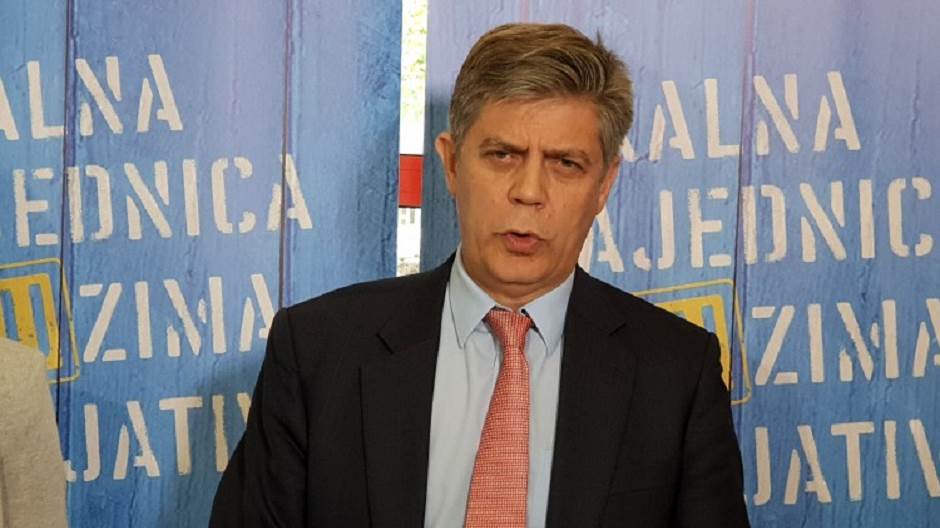PM calls for parties to join forces and push the country toward EU membership

The positive Opinion of the European Commission about Bosnia’s request for EU candidate status is a call to all forces in Bosnia and Herzegovina to stop trading in party interests and start respecting the rule of law, Bosnia’s Prime Minister said on Wednesday.
“The Opinion which the European Commission has published is a clear signal which confirms the European perspective of Bosnia and Herzegovina. It asks for the prevention of corruption and for a better reform of the administration,” Denis Zvizdic said.
The Opinion asks Bosnian institutions to put together guidelines for the country to continue its path towards EU membership.
“These recommendations are exclusively based on the standards and the requirements of the EU and that is why they cannot be a subject of internal compromises for the sake of achieving particular national or political goals internally in Bosnia and Herzegovina,” he said, adding that this means that “nobody in Bosnia has a legal basis for any kind of blackmail.”
“Its content is a clear guide regarding reforms so that we harmonise our political and economic system with EU standards,” he said, calling the document a “historic milestone which opens a new chapter” between the Union and Bosnia.
The Opinion will now be submitted to all 28 EU member countries for consideration, and the EC proposed it to be discussed when the new governments on all levels in Bosnia are formed. The document contains more than 170 pages of analysis of the situation in Bosnia when compared to EU standards.
After European Commissioner for Neighbourhood Policy and Enlargement Negotiations, Johannes Hahn, presented the document, Head of the EU Delegation in Bosnia, Lars-Gunnar Wigemark, spoke about the reform priorities for Bosnia.

“Bosnia and Herzegovina needs to improve the functioning of its judiciary. Citizens of this country need an independent judiciary which can efficiently do its job. True results are needed, not only indictments but also rulings. Perpetrators need to be brought to justice no matter who they are,” he said.
“The rule of law implies the fight against corruption in a systematic way. Citizens who report corruption must be protected, as well as whistleblowers,” he added.
Wigemark also pointed out the need for improving the rules on public procurement in the country and harmonising it with rules in the EU, as well as the need to depoliticise public companies.
“Public administration must be more professional and depoliticised. Representatives of political parties may not be part of the public administration,” he said, adding that the same principle must apply to public companies as well.
One of the most important changes Bosnia needs to make is improving fairness in the electoral process.
“The number one priority which the Opinion points out is implementing the election results while respecting identical standards,” he said, adding that elections in the city of Mostar need to finally take place.
The last election in the city took place in 2008 because of disagreements about the administrative composition of Mostar.
“It is necessary to regulate the financing of political parties and ensure the rights of all citizens, which means that every citizen, regardless of their nationality, must enjoy active and passive voting rights,” he explained.
He underscored the safety of journalists as an important issue for Bosnia, as well as ensuring the equality of women in decision-making processes.
Talks on Bosnia's EU accession should start once the country achieves the necessary degree of compliance with the EU membership and political criteria, the Hahn said as he presented the document.
"Bosnia and Herzegovina does not yet sufficiently fulfil the criteria related to the stability of institutions guaranteeing democracy, the rule of law, human rights and respect for and protection of minorities, set by the Copenhagen European Council in 1993,” he said.
“In this respect, the country needs to dedicate considerable efforts to sufficiently fulfil such criteria," the Commission wrote in its opinion after receiving Bosnia’s answers to its Questionnaire.
In February 2016, the European Commission sent over 3,000 questions to Bosnia in order to get a detailed insight into the situation in the country, its structure, the decision-making processes and how the country generally functions.
Bosnia needs to bring its constitutional framework in line with European standards and ensure the functionality of its institutions in order to be able to take over EU obligations, the Commission wrote.
Kakvo je tvoje mišljenje o ovome?
Učestvuj u diskusiji ili pročitaj komentare





 Srbija
Srbija
 Hrvatska
Hrvatska
 Slovenija
Slovenija



























































